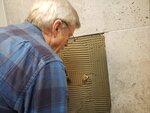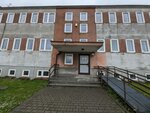When she arrived in the refugee post of Katowice, Ludmyla Tkachenko said to a National Geographic reporter: “Half my heart I left behind, half I brought with me .”
She and her …
This item is available in full to subscribers.
To continue reading, you will need to either log in, using the login form, below, or purchase a new subscription.
If you are a current print subscriber, you can set up a free website account and connect your subscription to it by clicking here.
Otherwise, click here to view your options for subscribing.
Please log in to continue |



When she arrived in the refugee post of Katowice, Ludmyla Tkachenko said to a National Geographic reporter: “Half my heart I left behind, half I brought with me.”
She and her sister Nelya fought back tears as they surveyed the shelters that were being organized. The sisters were forced to flee Ukraine along with over a million other traumatized souls.
They were the kind of people Nancy Wespetal found herself helping after Russia invaded Ukraine. She and her husband Tom have dedicated the last 30 years of their lives to helping as missionaries. Tom was a physician, but he also has a PhD in theology. He taught students in Ukraine and Russia who were studying to become pastors. Nancy started a mobile medical ministry serving rural areas of Russia and Ukraine. When the war started, Tom was back in the United States. Nancy found herself among those forced to evacuate Ukraine. At the Polish border, she was appalled by the confusion and suffering so she stayed, assisting authorities to organize the exodus and providing basic medical help.
As the crisis grew, Nancy reached out to Tom’s brother and sister-in-law, Mark and Jeannie Wespetal of River Falls, who agreed to join the relief effort for a month last November and December. Their fellow church member, Bob Gilbertson joined them. They flew into Katowice and took a short ride into Myslowice, an old Polish city of about 72,000 people where a shelter was being organized. Myslowice is 205 miles west of the Ukrainian border, less than the distance from Madison to River Falls, close enough for the Poles to feel the winds of war. An abandoned two-story office building with a basement had been designated as a shelter. When the American crew arrived it was populated by about 100 refugees—mostly middle-aged to older people, single and a few families with children.
The building was in difficult condition. It had been divided into 15 small rooms per floor—each housing as many as five people. Both floors had the basics but lacked adequate bathrooms. The basement was in a terrible state. Among other things, an inadequate sewage system had sometimes backed up, leaving a monumental clean-up job.
Bob Gilbertson is skilled in the trades and Mark is a hard-working handyman. They repaired showers and doors, installed locks and wardrobes, and constructed more living quarters and bathroom facilities for the second floor. As for Jeannie, a lifelong teacher, there were children in need—her specialty.
Other volunteers joined in the effort, including a construction crew from the US. Sometimes the day’s job demanded back breaking labor. A mountain of debris and junk had to be hauled away in vans and trailers. After the yard was cleared, they constructed a playground.
There were two groups of refugees—those who hoped to wait it out and return and those who were headed to permanent shelters in the UK. The Ukrainians who hoped to return lived on the second floor. Those headed overseas were assigned to the first floor. Each group was assigned one small room with no amenities—just cots or bunks. Both floors had a common kitchen and dining area which was also used as a place to gather and visit. Of course, language was a barrier. Nancy was the only bilingual speaker among the volunteers, but for everyone else it was gestures and phone translation apps. The construction crew had it a bit easier. If they needed a part they could simply pull up a picture on their phones at a hardware store.
At first Jeannie organized storage areas, washed clothes, did grocery shopping, prepared community meals and assisted Nancy in administrative duties. It soon became apparent that her skills could be useful in teaching English. Without any words in common, it was hard to get started. When asked how she did it, Jeannie said, “I’ve been a teacher my whole life. I figured things out.” Basic lessons were taught to those destined for England—sometimes as simple as holding up an important object and naming it, for example, “phone.”
The thought of being displaced because of bombs and bloodshed is sickening, but the volunteers saw less despair than one might expect. The Ukrainians, by and large were stoic, with an attitude of “that’s just the way it is.” Americans live in a country that has not fought a war on its own soil for over 150 years. Ukraine has been the scene of colossal battles and upheavals going back as far as the Mongol invasion in the 13th century. Just in the last 100 years, there was the 1932 famine known as the Holodomor, engineered by Stalin to subdue opposition. Almost four million Ukrainians starved to death. In the years that followed, Stalin purged the remaining opposition and sent them to Gulag labor camps. Nazi Germany invaded in 1941. Many large land battles were fought in Ukraine. In addition to the battles, the Holocaust raged. In 1941, 34,000 Jews were murdered in a ravine outside Kiev in what was known as the Babi Yar Massacre. As Stalin gained control of the country, he deported over 200,000 Crimean Tartars. Over half of them starved to death. By the war’s end Ukraine had lost between five and seven million people. Then, in 1986, only 80 miles from Kiev, a reactor exploded at the Chernobyl nuclear reactor. As of 2000, over 3.5 million Ukrainians were receiving state benefits as radiation sufferers. Ukrainians are no strangers to hardship.
What the American volunteers saw in the eyes of the refugees may have been an acceptance of recurring generational tragedies. Perhaps this helped them tolerate conditions that Americans would find untenable. Imagine being assigned to a small room with four or five other people, usually family but sometimes not. There was no privacy, but no alternative.
Acceptance of their situation did not mitigate the refugees’ outraged feelings toward Russia. Russia and Ukraine share a common border. There are many family relationships between the two countries. It was heartbreaking for the refugees to talk with Russian relatives and hear them parrot lies fed to them by the Russian propaganda machine, such as the accusation that Ukrainians were eating babies. The refugees regarded Putin as no less an evil actor than Stalin or Hitler.
The River Falls volunteers were there during the Christmas season. The American missionaries tried to brighten spirits by providing presents not only for those sheltered in Myslowice but also for children still remaining in Ukraine. This led to a Mission Impossible moment for Mark. Mark’s crew was directed late at night by Google maps to a meeting spot where presents would be transferred to another van which would cross into Ukraine. The volunteers eventually found themselves on a dirt road which led to a large ditch. Time for a U-turn. Mark got out to guide while Nancy drove. Stressed, Nancy accidentally drove into the ditch. The van stuck with its rear wheels off the ground. It was unsafe to get back in the van for fear it might tip over. They were stranded in the middle of nowhere in a foreign country. They were finally able to contact the people who were on the other end of the gift transfer and give them their location. Together they drove around and found an open fuel station that sold towing straps with which they pulled the van out. It was a long night.
Navigating the streets of a foreign country led to another traveling mishap. Mark was on an errand in the van. They came to a confusing rotary with several exits. Things were moving fast. Mark did the best he could and turned into a narrow street—with railroad tracks in the center. The van was on a trolley line. Not able to back up quickly enough, a minor fender bender occurred. But Polish authorities seemed to accept with patience the accident as part of the inevitable disruption created by the refugee crisis.
Since the war began, Poland has absorbed, according to UNESCO, over 1.6 million refugees. Though volunteers had no doubt that the Poles they worked among acted out of goodness, they also began to understand that the Poles’ willingness to help was in part a result of the fear that their country would be next if Ukraine falls. It’s uncertain how long Poland can continue to absorb the costs.
Though it’s tempting to react to far-away tragedies as something that could never happen here, tragedy can happen anywhere. The refugees were just like Americans, mostly middle class. Regardless of ethnicity, religion or politics, all people suffer alike. An abiding truth in the volunteers’ experience is that kindness transcends differences and is a solace for sorrow and despair. The Wespetals remember, for example, the night a new couple moved in with a young daughter. At first, the newcomers sat on the stairway, quiet, helpless and steeped in sadness and worry. What would become of them? A few days later, the volunteers found out the little girl was about to turn three. Everyone turned out for a surprise birthday party. The next day the family showed up happier and eager to volunteer for work assignments, go to class and become involved. All because of a birthday party.
Not everyone can go to another continent to help, but if kindness can comfort a family from a war-torn nation, it can certainly help those in need here at home.
“Be kind. Everyone you meet is carrying a great burden.” -Author unknown.
Dan Woll is the author of four books and numerous articles. You can find his books available on Amazon.